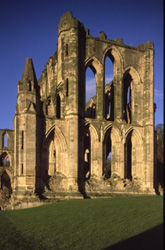 |
 |
 |
 |
 |
 |
 |
|
The Dissolution - the end of monastic life at Rievaulx (1/5) By the turn of the sixteenth century numbers at Rievaulx had fallen considerably. There were changes also in land-holding, for more of the abbey’s lands were now leased and not exploited directly. In other ways, however, monastic life carried on as before and Rievaulx retained its appeal to outsiders seeking burial and other spiritual benefits. For example, a John Clervaux stated in his will of 1510 that he wished to be buried at the door of the choir at Rievaulx, before the statue of Our Lady, and requested that a mass be said for his own soul and that of his parents in front of the statue of Mary, which stood in the body of the church.(1) Bequests were also made by relatives of the community, such as John Stores, whose son William was a monk of the abbey. John stated in his will of 1506 that 40s should be left to the abbot of Rievaulx for his absolution and 10s to his son, for a trental. (2)
The end of monastic life at Rievaulx was, however, imminent. Henry VIII’s assertion of authority over the Church in England set the wheels in motion for the dissolution of the religious houses in England and Wales, and by the end of 1538 the Rievaulx community had surrendered its abbey to the royal commissioners, the monks had disbanded and their buildings destroyed. Few could have anticipated these changes. Indeed, it was said that whenever the monks of Rievaulx read the following prophecy foretelling their fate, they would throw the book in which it was written across the floor in a rage, denying that such a thing could ever come to pass:
|
